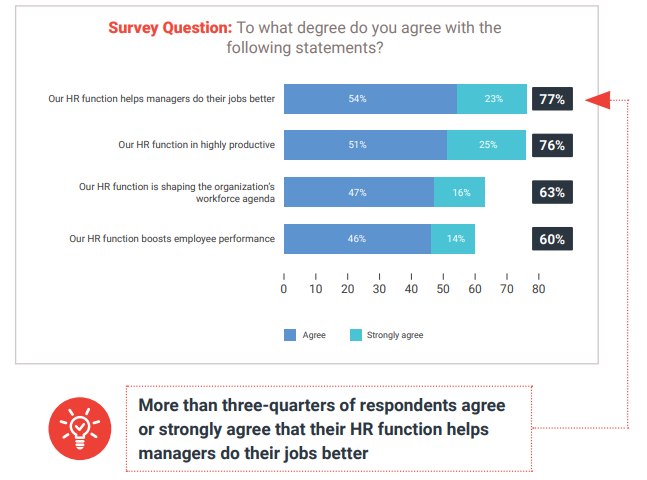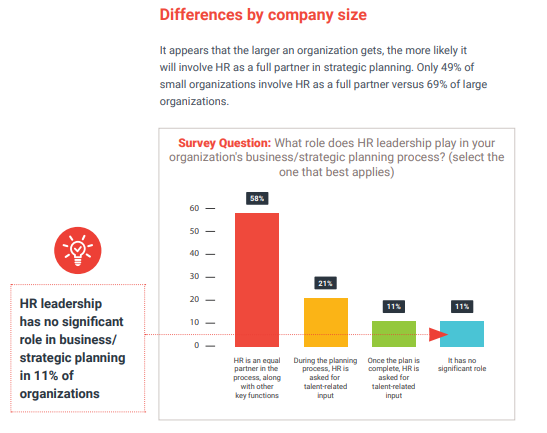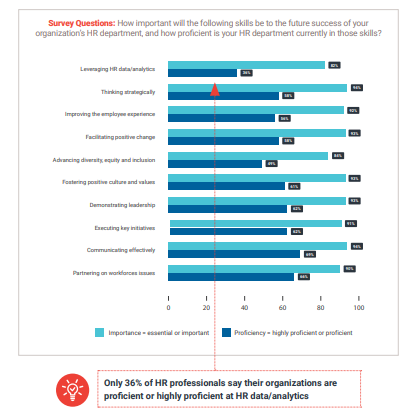Since early 2020, Human Resources (HR) has faced unprecedented challenges due to the Covid-19 pandemic. Seldom in history has the HR function needed to pivot so quickly and dramatically to meet such urgent workforce and business needs. These trends are requiring HR to rethink its roles and priorities while the world of work is transforming. Perhaps the biggest shift in HR’s thinking is the recognition that in many organizations the post-pandemic return-to-work will not be a return to the way work was done in 2019. Much has changed, and at least some of those changes will stick and evolve further. In this study, we look at the attitudes, concerns, priorities and skills of today’s HR professionals as well as their views on what will be most important in the near future.

Only 14% strongly agree that their HR function boosts employee performance
HR’s core outcomes include: ● being a highly productive department ● helping managers do their jobs better ● boosting employee performance ● shaping the organization’s workforce agenda Any rating less than “agreeing” that HR achieves these outcomes should be seen as a failure—if HR isn’t achieving at least some of these outcomes, then what is it for? One would hope that in many cases respondents would strongly agree that HR achieves these outcomes. The number of respondents who strongly agree with these statements, however, is relatively low, ranging from 25% for “our HR function is highly productive” down to just 14% for “our HR function boosts employee performance.” Out of the four outcomes, HR scores lowest in the area of employee performance, with only 60% agreeing to any extent. On the other hand, more than three-quarters (77%) agree or strongly agree that HR helps managers do their jobs better. One positive note is that considerably more HR professionals agree or strongly agree that their HR function boosts employee performance than they did in early 2020, the last time we conducted this research: 60% compared with only 41% in 2020. Moreover, the percentage who strongly agree rose nearly threefold, from 5% in 2020 to 14% in 2021. Employee performance represents the largest year-to-year increase for this question. This suggests that many HR professionals view the changes they have helped facilitate over the last year—such as more remote work, flexible scheduling and management training—have served to boost employee performance to some degree.

HR leadership is an equal partner in the business/strategic planning process in 58% of organizations
Considering the importance of talent to the success of all organizations, one would expect HR leadership to typically be an equal partner in business/strategic planning. Although this is true in a majority of cases (58%), being an equal partner is not as prevalent as we might hope. After all, HR should have the greatest depth of knowledge about one of their most important strategic resource: employees themselves. An additional 21% say that during the planning process, HR is asked for talent-related input. This potentially is important if the input is detailed and acted upon. On the other hand, it is also potentially limiting if HR is simply providing basic data on, for example, the number of positions that will need to be filled next year or the projected cost of total rewards. HR likely has a considerably lower impact in the 22% of organizations where HR leadership has no significant role in business/strategic planning or where HR is asked to develop a talent strategy after the business/strategic planning process is complete.CEOs who are not involving HR leaders in business/ strategic planning should consider asking themselves how they can reconcile this with the strategic importance of talent. If they don’t know how to integrate talent strategy directly into business strategy, then that’s a problem to be solved, not one to be ignored by excluding HR as an equal partner in planning.

The biggest skills gap between importance and current proficiency is in leveraging HR data/analytics
We compared how important various HR abilities will be in the near-term future to how proficient HR is at the moment. We found gaps between the percentage who claim a skill is “important” or “essential” and the percentage who gauge their department’s proficiency as “proficient” or “highly proficient.” The three biggest gaps between importance and proficiency are in: ● leveraging HR data/analytics ● thinking strategically ● improving the employee experience In terms of HR data/analytics, we believe that the HR function suffers from the gap between the early and perhaps unrealistic expectations for the function and the real-world difficulties of doing relevant HR analytics. We should note that this gap is among the most consistent problems we have seen over the last several years. Still, we are hopeful that as HR departments gain experience with analytics and new technologies are adopted, the importance-proficiency gap will close. When it comes to thinking strategically, we can take it as a positive sign that HR can see the gap in its ability. The last year has been a tough one to be strategic because so much of HR’s attention has been focused on responding to the pandemic. With luck, in the near future HR will have more time to take a strategic perspective, although with this sort of activity HR needs to ‘make time’ rather than sit back and wait for a slow day.The last of the three areas with the biggest gap is improving the employee experience. Again, the last year has been a uniquely difficult one in terms of creating the right employee experience. It is encouraging to see that HR is aware of the challenge.
